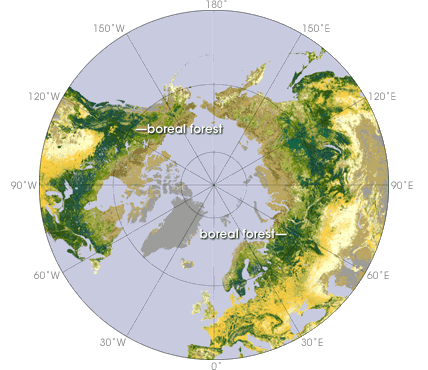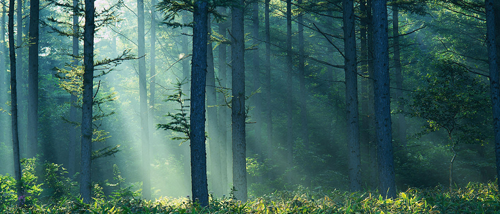More unfortunate climate change news for us and the candidates – this time from the boreal forests. The Guardian and others are reporting on a new study that finds trees are absorbing less CO2 as the world warms.
The ability of forests to soak up man-made carbon dioxide is weakening, according to an analysis of two decades of data from more than 30 sites in the frozen north.
The finding published today is crucial, because it means that more of the CO2 we release will end up affecting the climate in the atmosphere rather than being safely locked away in trees or soil.
The results may partly explain recent studies suggesting that the amount of CO2 in the atmosphere is increasing faster than expected. If higher temperatures mean less carbon is soaked up by plants and microbes, global warming will accelerate.
Worldwide, only tropical rainforests are larger then boreal or northern forests. They cover Alaska, northern Canada, Scandinavia and Siberia.
 Any minor change in their ability to use CO2 could have serious climate impact across the entire earth. Previously there was some optimism that a greening in the northern forests would help reduce CO2, but instead it could lead to increased warming.
Any minor change in their ability to use CO2 could have serious climate impact across the entire earth. Previously there was some optimism that a greening in the northern forests would help reduce CO2, but instead it could lead to increased warming.
The research study, Net carbon dioxide losses of northern ecosystems in response to autumn warming is being published today by the science journal Nature and was conducted by a team of Canadian, Chinese, and European researchers.
As the story about the study, New research suggests longer autumns inhibit carbon uptake in forests in the Canadian Press notes, “theories suggesting warmer springs and summers will reduce carbon dioxide through greater growing activity are probably too optimistic.” The reason being is autumn temperatures are warming faster than spring temperatures. So, combined with hours of daylight growing shorter as the winter approaches, trees absorption of CO2 slows down “while carbon emissions increase as busy soil microbes feast on a fresh crop of fallen leaves.” So warmer autumns null out warm springs.
As The Guardian story explains this is a “surprise rethink” and “the research could partly explain results by the Global Carbon Project, which confirmed that the rise in CO2 levels in the atmosphere is accelerating.” The increase is partially due to increased CO2 emissions from China and other nations, but research suggests “weakening carbon sinks were also to blame.”
 |
The use of forest carbon sinks is advocated by each of the three of Democratic frontrunners – Hillary Clinton, John Edwards, and Barack Obama. Each plan to use trees in some way to help remove the carbon dioxide from our atmosphere.
This is what Senator Hillary Clinton says:
I want to focus on international attention to solve the problem of global deforestation. We’re losing our forests dramatically. They play such an important role in removing carbon dioxide from the atmosphere and we need to figure out how to have a win-win strategy for that.
This is John Edwards‘ plan:
Create GreenCorps: Idealistic young Americans can help fight climate change by conducting volunteer energy audits, weatherizing homes, installing home solar panels, and training neighborhood groups to do the same. Volunteers will also plant carbon sinks – such as fast-growing forests that store carbon – on urban, conservation and federal lands. Edwards will create a GreenCorps within AmeriCorps to create opportunities for them to serve.
And Senator Barack Obama idea is this:
Confront Deforestation and Promote Carbon Sequestration: Obama will develop domestic incentives that reward forest owners, farmers, and ranchers when they plant trees, restore grasslands, or undertake farming practices that capture carbon dioxide from the atmosphere.
But this new study suggests with northern forests lessening ability to absorb CO2, then plans that are based on trees – especially northern trees – may need to be rethought.
According to John Miller, a University of Colorado Climate scientist who the Guardian article quotes as commenting on the study, 50 percent of all of the CO2 we produce is being removed already by the oceans and land ecosystems. “Unfortunately,” he writes, “we have no guarantee that the 50% discount will continue, and if it disappears we will feel the full climatic brunt of our unrelenting emission of CO2 from fossil fuels.”
Since the start of the Industrial Revolution, the earth has been sequestering carbon away, lessening the brunt of our carbon lifestyle, but we keeping more CO2 into the atmosphere than the earth’s systems can mitigate. So part of our rethinking about how to address global warming, I think we and our presidential candidates will need to include ways to significantly reduce our carbon dioxide emissions. If we don’t, the earth is indicating its forests won’t be able to keep helping.

31 comments
Skip to comment form
Author
I think the earth and its systems keep proving to be a lot more complicated than we had previously believed.
Is the effect the same in more tropical climates? Would it be possible to somewhat offset the effects in the north by reforestation efforts in places with longer growing seasons?
Has anyone even done any research on this?
Oh, well, thanks for a great diary, even if we’re doomed.
products plus the declining number of forests and non-genetically engineered crops…I’d say it makes sense. The planet, like my house, can tolerate only so much garbage before it become a hazard to walk through it.
I keep posting this information on every site, and every global warming diary, trying to get the discussion going in this direction. The global warming aspect of excessive CO2, while serious, is not the critical part of the equation; the oceans turning acidic is the elephant in the closet. Briefly-CO2 is absorbed by the ocean, where, with trace elements, carbonic acid is formed. As the carbonic acid concentrations increase, it starts to dissolve calcium carbonate, which is what reefs, and sea shells are made up of (damned dangling particple, couldn’t figure how to get rid of it, oh well, sorry Mr Wells). Plankton have a stage in their life cycle when they are encased in a calcium carbonate shell, which is also dissolved by the carbonic acid. When the shell is dissolved the plankton die. According to my 10 grade biology teacher (sooooo many years ago) plankton are responsible for 80% of the earth’s oxygen generation. So, kill the plankton, kill the life on Earth. This is information from Mother Jones, March-April, ’06. The article goes on to say that that if something drastic and immediate isn’t done, by 2050 the acidification will reach the same levels as they were 250-260 million years ago, the time of the largest mass extinction in the world’s history, when over 90% of sea based life died, and over 75% of land based life perished. In the spirit of full disclosure, I have read somewhere, two sentences stating that acidification might not be proceeding quite so fast as previously thought, because the trace elements necessary are only found near the continental shelf, and shores. Also, this line of investagation is fairly new, so the world might catch a break as it is studied further. Let us hope, eh?
BTW if everone is tired of hearing me spout off about my one trick pony let me know and I will knock it off.
Have a nice day. :~)
I keep posting this information on every site, and every global warming diary, trying to get the discussion going in this direction. The global warming aspect of excessive CO2, while serious, is not the critical part of the equation; the oceans turning acidic is the elephant in the closet. Briefly-CO2 is absorbed by the ocean, where, with trace elements, carbonic acid is formed. As the carbonic acid concentrations increase, it starts to dissolve calcium carbonate, which is what reefs, and sea shells are made up of (damned dangling particple, couldn’t figure how to get rid of it, oh well, sorry Mr Wells). Plankton have a stage in their life cycle when they are encased in a calcium carbonate shell, which is also dissolved by the carbonic acid. When the shell is dissolved the plankton die. According to my 10 grade biology teacher (sooooo many years ago) plankton are responsible for 80% of the earth’s oxygen generation. So, kill the plankton, kill the life on Earth. This is information from Mother Jones, March-April, ’06. The article goes on to say that that if something drastic and immediate isn’t done, by 2050 the acidification will reach the same levels as they were 250-260 million years ago, the time of the largest mass extinction in the world’s history, when over 90% of sea based life died, and over 75% of land based life perished. In the spirit of full disclosure, I have read somewhere, two sentences stating that acidification might not be proceeding quite so fast as previously thought, because the trace elements necessary are only found near the continental shelf, and shores. Also, this line of investagation is fairly new, so the world might catch a break as it is studied further. Let us hope, eh?
BTW if everone is tired of hearing me spout off about my one trick pony let me know and I will knock it off.
Have a nice day. :~)
crowding forests, moving onto barren land, breathing huge volumes of CO2, bringing on another ice age.
Dennis Kucinich won’t stand for these monsters. Probably Hillary and Edwards won’t either. Can’t be real sure about Obama. He does have some crazy ideas at times.
The more delicate souls here might want to hide their eyes from a monster version of arabidopsis doing just fine under drought conditions with its death gene silenced:
http://www.senesco.com/stress.htm
Fortunately we have the environmentalists to save us from such horrors.
I have wondered exactly how these plants manage to survive where the weaklings of their species die. Understand there are no imported genes in these monsters like the scary tomato with an arctic fish gene that was supposed to have resistance to cold (it didn’t).
Betcha those monster poplars would glomb onto a whole bunch of CO2 if we were stupid enough to unleash them on the world.
Never know about monsters, of course.
BTW a turn of the Death Switch kills cancer cells in animals. Mean stuff I tell you.
Best, Terry
There are movements afoot to reforest parts of China with bamboo. I have a friend who is very involved with this.
http://www.coa.gov.tw/nam/sugg…
Bamboo absorbs more C02 than a mature tree. I’m at work so I can’t research this today. I’ll see what information I can find later.